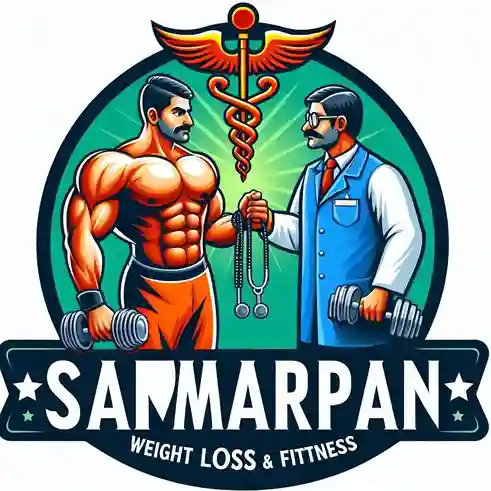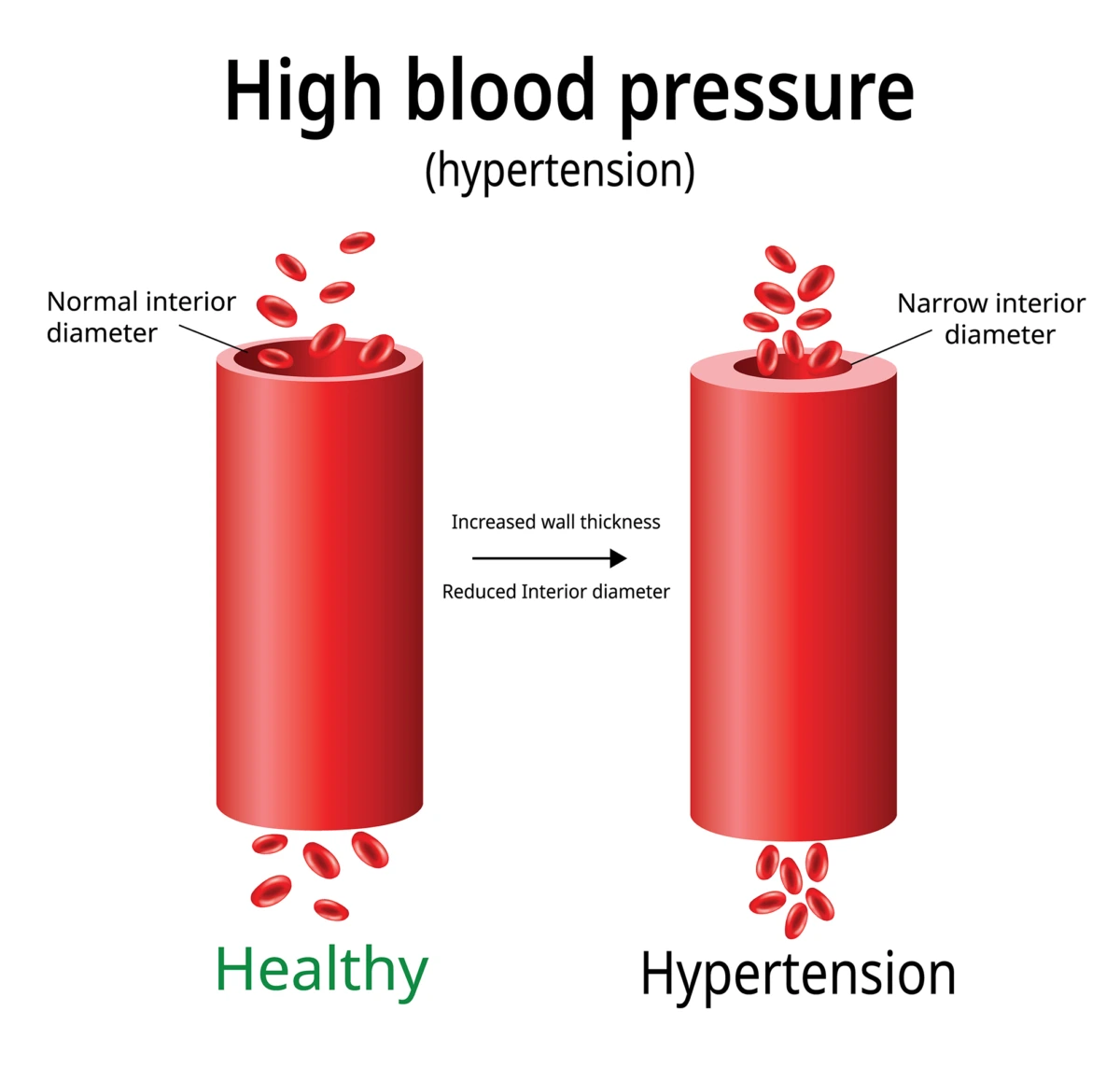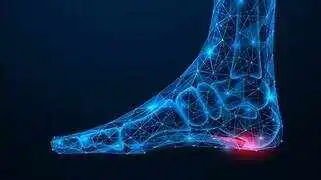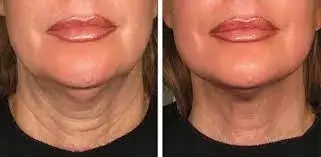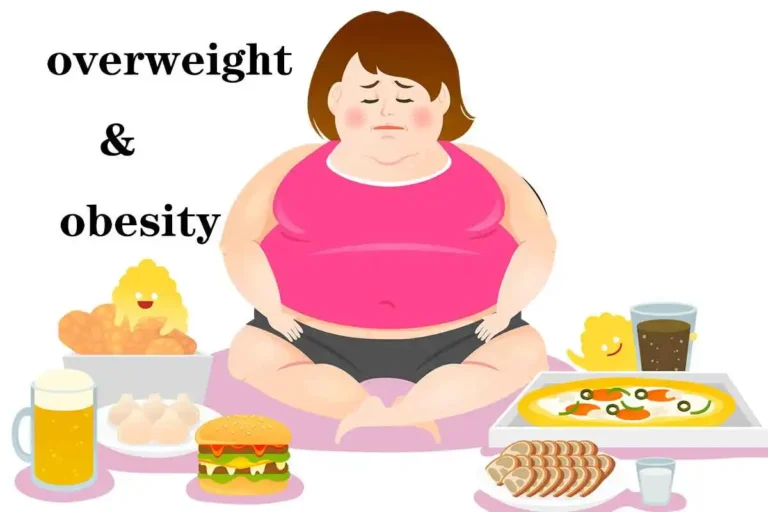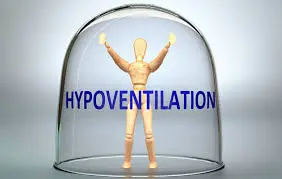High Blood Pressure (Hypertension)
What is High Blood Pressure (Hypertension)?
High blood pressure, or hypertension, is a common medical condition in which the force of the blood against the walls of the arteries remains consistently elevated. Over time, this increased pressure can lead to serious health complications, including heart disease, stroke, kidney damage, and other vascular disorders.
Because high blood pressure typically doesn’t show any symptoms, medical professionals refer to it as a “silent killer.” Therefore, even though you may not be aware of any problems, your body nonetheless suffers harm.
The force applied to your artery walls during a heartbeat or contraction is indicated by the systolic blood pressure, which is the highest number.
Normal blood pressure is 120/80 mm Hg.
Elevated blood pressure: The bottom number is below, not over, 80 mm Hg, while the upper number is between 120 and 129 mm Hg.
How can I tell if my blood pressure is elevated?
Even if you think you’re healthy, you can do this by visiting a doctor for an annual examination. You will not become sick from having high blood pressure. Therefore, these examinations are essential and may save lives. Your provider will suggest lifestyle modifications and/or medication to control your blood pressure if it is higher than normal.
What is considered High Blood Pressure?
Depending on where you reside, there are subtle differences in what constitutes high blood pressure. Healthcare professionals in the United States define hypertension, or high blood pressure, as:
The systolic and diastolic blood pressures must be at least 130 and 80 mmHg, respectively.
Healthcare professionals in Europe define hypertension as:
The upper limit is 140 mmHg or more.
A minimum bottom value of 90 mmHg.
How common is High Blood Pressure?
A lot of people have high blood pressure. This amounts to almost 116 million individuals.
According to WHO estimates, more than 1.2 billion people between the ages of 30 and 79 suffer from hypertension worldwide. Approximately two out of every three such people reside in low- or middle-income nations.
Symptoms and Causes:
What symptoms and indicators indicate high blood pressure?
For this reason, medical professionals refer to it as a “silent killer.” For years, you can be unaware that you have excessive blood pressure.
Symptoms like headaches, heart palpitations, or nosebleeds may occur if your blood pressure is 180/120 mmHg or higher. This elevated blood pressure is a hypertensive crisis that has to be treated right away.
What are the types of high blood pressure?
One of two forms of hypertension will be identified by your healthcare provider:
Primary hypertension: Primary hypertension or essential hypertension are terms used to describe this kind of elevated blood pressure. It usually takes many years for it to develop gradually. Atherosclerosis, or plaque accumulation in the arteries, raises the risk of hypertension.
Secondary hypertension: An underlying disease is the source of this kind of elevated blood pressure. It typically appears suddenly and causes an increase in blood pressure, in contrast to primary hypertension. The following conditions and drugs may cause secondary hypertension:
- Tumors of the adrenal glands
- Congenital heart defects are blood vessel issues that exist from birth.
- Prescription medications such as birth control pills, cough and cold remedies, and certain painkillers
- Illegal substances like amphetamines and cocaine
- Kidney disease
- Obstructive sleep apnea
- Thyroid problems
- Blood pressure might occasionally rise just by having a checkup.
Primary and secondary hypertension can coexist. For instance, an existing elevated blood pressure level may increase due to a new secondary reason.
It is also possible that you may hear about intermittent high blood pressure. These types of hypertension include:
White coat hypertension: In a medical setting, your blood pressure is raised, but it is normal at home.
Masked hypertension: Blood pressure that is normal in a doctor’s office but elevated at home or while engaging in regular activities is known as “masked hypertension.”
Sustained hypertension: Your blood pressure is raised at home and in medical facilities.
Nocturnal hypertension: When you sleep, your blood pressure rises.
What causes High Blood Pressure?
Primary hypertension’s etiology is unclear. A confluence of factors typically causes it. Typical reasons include:
- unhealthy dietary habits, such as eating a lot of sodium.
- insufficient exercise.
- excessive intake of alcoholic beverages.
- There is at least one specific cause of secondary hypertension that medical professionals can pinpoint.
The following are typical reasons for secondary hypertension:
- Certain medications include immunosuppressants, NSAIDs, and oral contraceptives (the pill).
- kidney illness.
- apnea due to obstruction in sleep.
- Aldosteronism primary (Conn’s syndrome).
- recreational use of drugs, such as cocaine and amphetamines.
- Conditions that impact blood flow in the arteries and veins of your kidneys are known as renal vascular disorders. One typical instance is renal artery stenosis.
Is High Blood Pressure genetic?
Researchers think that high blood pressure is influenced by heredity. You are more likely to get high blood pressure if one or more members of your immediate biological family already have it.
Risk factors of Hypertension:
The following are risk factors that increase your likelihood of having high blood pressure:
Age: After age 65, high blood pressure is more common in women.
Race: High blood pressure is pervasive in Black individuals. Black folks encounter it earlier in life than white people do.
Family history: You are more likely to get high blood pressure yourself if you have a parent or sibling who has it.
Obesity or being overweight alters the kidneys, blood arteries, and other organs. These alterations frequently raise blood pressure. The risk of heart disease and related risk factors, such as excessive cholesterol, is also increased by being overweight or obese.
Lack of exercise: Weight gain might result from inactivity. Being overweight increases the risk of hypertension. Inactive people also typically have greater heart rates.
Tobacco use or vaping: Blood pressure is instantly raised for a brief time when smoking, chewing tobacco, or vaping. Smoking tobacco damages the walls of blood vessels and accelerates the artery-hardening process. Ask your caregiver for tips on quitting smoking if you smoke.
An excessive amount of salt. The body may retain fluid if it contains an excessive amount of salt, often known as sodium. Blood pressure rises as a result.
Low potassium levels: Potassium aids in regulating the body’s cell salt content. Heart health depends on a balanced potassium intake. A potassium-deficient diet or certain medical conditions, like dehydration, can cause low potassium levels.
Drinking too much alcohol: Increased blood pressure, especially in men, has been associated with alcohol consumption.
Stress: A brief rise in blood pressure might result from high stress. Blood pressure can be further elevated by stress-related habits such as smoking, consuming alcohol, or eating more.
Pregnancy: Pregnancy can occasionally result in high blood pressure.
Adults make up the bulk of those with high blood pressure. Children’s high blood pressure might be caused by heart or kidney issues. However, lifestyle choices like eating poorly and not exercising are the cause of high blood pressure in an increasing proportion of children.
What are the Complications of this condition?
Because high blood pressure puts too much strain on the artery walls, it can damage blood vessels and bodily organs. The longer blood pressure stays out of control, the greater the danger.
Complications from uncontrolled hypertension can include:
Heart attack or stroke: A heart attack, stroke, or other issues may result from the arteries being thicker and harder as a result of high blood pressure or other circumstances.
Aneurysm: When a blood vessel weakens and swells as a result of high blood pressure, an aneurysm may form. A ruptured aneurysm can have potentially fatal implications.
Kidney problems: The kidneys’ blood arteries may weaken or narrow as a result of high blood pressure. Kidney damage could be the outcome.
Eye problems: Blood vessels in the eyes may thicken, constrict, or tear as a result of high blood pressure. This may cause blindness.
Metabolic syndrome: Involves the erratic breakdown of glucose, another name for sugar. Increased waist circumference, elevated triglycerides, decreased HDL (or “good”) cholesterol, elevated blood pressure, and elevated blood sugar are all symptoms of the syndrome.
Changes with memory or understanding: Uncontrolled hypertension can impair cognitive function, memory, and learning.
Dementia: Blood flow to the brain may be restricted by narrowed or obstructed arteries. Vascular dementia is one kind of dementia that may result from this. A stroke that cuts off the brain’s blood supply can also result in vascular dementia.
Diagnosis and Tests:
How is high blood pressure diagnosed?
Your blood pressure is typically taken by providers at yearly physicals and other appointments.
To find potential causes, they will discuss your lifestyle and medical history with you.
Management and Treatment:
What are the treatments for high blood pressure?
Medication and lifestyle changes are two ways that high blood pressure is treated. Medical professionals suggest treatment based on your blood pressure readings, underlying medical issues, and the reasons behind your high blood pressure.
Lifestyle changes to lower your blood pressure:
You might be asking if there is a natural way to lower blood pressure. You can lower your blood pressure without using medication in certain situations.
Here are a few tried-and-true natural methods to reduce blood pressure:
Keep a healthy weight for you: You can acquire a goal range from your healthcare practitioner. Consume a nutritious diet. The DASH diet is one example.
Cut down on salt: Your daily salt consumption should ideally be kept to a maximum of 1,500 mg. If you initially find this too difficult, you may start by reducing your daily dosage by at least 1,000 mg.
Get enough potassium: Ideally, you should get 3,500 to 5,000 mg daily from your diet rather than pills.
Exercise: Consult your healthcare provider for guidance to begin. Generally speaking, begin slowly and increase your weekly aerobic activity to 150 minutes. Resistance training, such as with light weights, is also helpful.
Limit alcohol: If you consume alcoholic beverages, do so sparingly. To lower your blood pressure, doctors may occasionally advise lifestyle modifications in addition to medicine.
Medications to lower your blood pressure:
When beginning treatment, four kinds of blood pressure drugs are “first-line” (the most popular and effective):
The angiotensin II hormone, which the body naturally utilizes to control blood pressure, is prevented from being produced by angiotensin-converting enzyme (ACE) inhibitors. Your blood arteries do not constrict when the medication inhibits angiotensin II.
Calcium channel blockers allow your blood vessels and heart muscle cells to relax by preventing calcium from entering them.
Diuretics, sometimes known as water or fluid pills, lower blood fluid levels by flushing out excess salt. Diuretics are frequently taken with other medications for high blood pressure, sometimes in a single dose.
To better control your blood pressure, your doctor may combine these first-line medications with other prescriptions.
Discuss potential adverse effects with your healthcare physician. They might try a new drug or alter your dosage. You shouldn’t stop taking the medication by yourself.
Certain drugs should not be taken while pregnant. Therefore, if you are or may become pregnant, make sure to inform your healthcare professional.
Prevention:
Can I prevent high blood pressure?
Thankfully, there are steps you may take to lower your chance of getting high blood pressure. These consist of:
Follow a healthy eating plan: Maintaining a normal blood pressure level requires taking this crucial step.
Cut down on sodium: You should cut back on sodium in your diet to avoid hypertension. Try not to take more than 1,500 mg daily.
Keep a healthy weight: Maintaining a healthy weight goes hand in hand with eating the right foods. Your blood pressure will drop to healthier levels if you lose extra weight through diet and exercise.
Keep active: Simple physical activity like walking can help you lose weight and lower your blood pressure.
Drink alcohol in moderation: Blood pressure can be raised by consuming more than one drink per day for women or those who were assigned female at birth, or more than for males or those assigned male at birth, two drinks per day One ounce (oz) of alcohol, five ounces of wine, or twelve ounces of beer are all considered drinks.
Summary:
Hypertension, or high blood pressure, is caused when the force of blood pressing against the artery walls is consistently too great. Over time, this excessive pressure can damage blood vessels and organs.
FAQ:
What is high blood pressure’s main cause?
Many adults suffer from high blood pressure, which may go undiagnosed. Obesity, smoking, and inactivity are some of the factors. Frequent examinations can aid in its management.
Which six signs of hypertension are present?
If you experience chest discomfort, shortness of breath, back pain, numbness, weakness, visual changes, or trouble speaking and your blood pressure is greater than 180/120, call 911. Study up on hypertension crises.
References:
High Blood Pressure (Hypertension). (2024, December 17). Cleveland Clinic. https://my.clevelandclinic.org/health/diseases/4314-hypertension-high-blood-pressure
(High Blood Pressure (Hypertension) – Symptoms & Causes – Mayo Clinic, 2024)
Wikipedia contributors. (2024, December 2). Hypertension. Wikipedia. https://en.wikipedia.org/wiki/Hypertension
